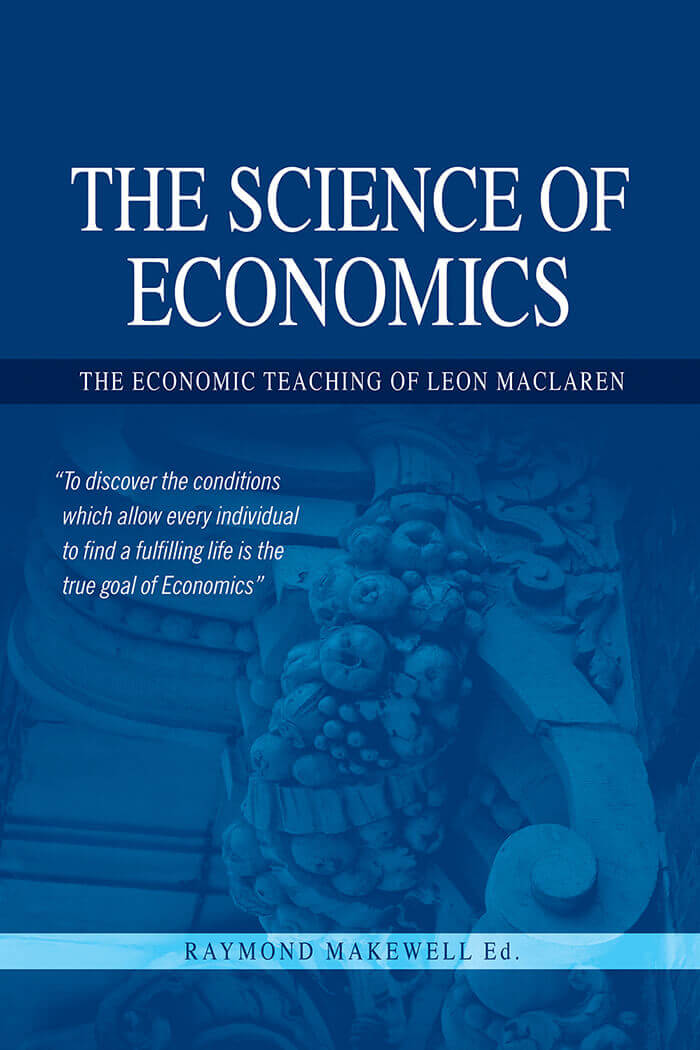A reviewer of The Science of Economics in Network Review, the Journal of the Scientific and Medical Network, wrote ‘The editor of The Science of Economics, Raymond Makewell, has done a wonderful job of making MacLaren’s thinking relevant to our times … MacLaren has important ideas on economic justice that we also need to reflect on in the wake of banking scandals and growing economic inequality.
Although MacLaren made his thought independent of its original inspiration in the work of Henry George, there is no doubt that George’s influence runs right through this book … MacLaren, like George, insists that land is the basis of economic activity … George’s vision … is certainly the inspiration for the many groups today arguing for the LVT [land value tax], and, in MacLaren’s reworking of it, deeply thought-provoking.
Whether one agrees that MacLaren’s economics is more scientific than any other, or agrees with the arguments for the LVT, is not the point here. What matters is to engage with any thinker who is serious about economic justice. It matters because, although it may seem like a deeply refractory problem, not thinking about it is collectively the most likely cause of the economic mess we are in today. This book will be of great interest to anyone concerned with this problem.’
Two reviews of Re-solving the Economic Puzzle by different reviewers appeared in the same issue of the American Journal of Economics and Sociology stating: ‘[Rybeck] gives us a multifaceted and enlightening book combining public policy analysis and autobiography … Rybeck is probably best known for developing the concept that land value taxation is actually a “super user charge” (1983). First it constitutes payment for the “license” to exclusive use of a particular site and, second, it overcomes the difficulty of setting individual user charges for each public service because location values provide an excellent means of judging the value of the totality of public facilities and services available to users of any particular site.
‘Its major benefits would include abundant jobs at living wages, affordable housing for all, self-financing infrastructure, an end to sprawl and urban decay, and a rational tax system, to give only the first five of his list of 10. He concludes that land value taxation should appeal to reasonable people on both the left and the right, providing greater social justice while remaining within the framework of a free-market system.
‘A broader application of Henry George’s insight into the role of the community in creating value has the potential to make the Georgist tradition central to contemporary debates over how to turn the United States away from its increasing trend towards plutocracy and develop an ethical economy that is compatible with democracy.’ Stephan Barton
‘While the media, politicians, and even economists claim that we must choose among painful trade-off alternatives, Rybeck shows there is a way to solve the puzzle. The solution is a tax shift that replaces taxes that hamper the economy with public revenues that do not hurt and may even benefit the economy … This book is truly one of the best introductions to real-world economics that I have come across.
‘His book is an ethical as well as an economic inquiry. Rybeck provides an analogy with slavery: the main argument against slavery was moral, beyond any economic analysis. For land issues, [his] message is one of harmony, as the policy that provides the greatest justice is also the policy that promotes maximum prosperity.
‘Land is central to the economy and to history, yet modern economists ignore it. While growing inequality is much discussed, there is little mention of the concentration of land ownership … The concentration of land value in a few hands is a global phenomenon.
‘This is indeed a book that should be read by every economist, every student, and every person who has been puzzled and troubled by our economic woes. It would be wonderful if a policymaker happens to read this book and actually implements its solution, but otherwise, the people should know that there are economic solutions, and that it is politics, not economics, that blocks universal prosperity.’ Fred Foldvary
Click here for full review







